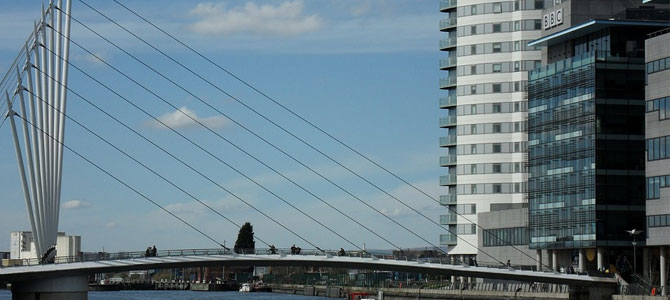
BBC’s online services must move towards cooperation rather than competition
How will the BBC change over the next ten years? The BBC White Paper released this week suggested dramatic shifts. But while technology has changed how people listen and watch media, it’s remarkable how little attention was paid to the role of the web and the online environment to the BBC’s operations in the paper, particularly its news coverage.
The issue of whether the BBC crowds out the private sector was discussed mostly in reference to the production of television programmes, with the counter argument that BBC investment in content serves to encourage as well as discourage private investment. ITV is in rude health with revenue up 14% last year to £3.4 billion and profits up 6% to £641m – clearly, despite losing some audience share, the BBC’s main commercial rival is hardly about to fail from having been crowded out of the marketplace.
It’s a very different situation comparing the BBC’s news production to newspapers. The Guardian, one of the most successful online newspapers in the world, made an operating loss of £58m last year. Readers don’t like paying for online news, and advertisers aren’t particularly keen on advertising in online newspapers. The BBC’s website is among the world’s most visited with 101m unique browser visits in January 2015, and its British-facing news website is easily the most popular in the UK. Well over half of people reading news online access the BBC, whereas less than 10% access the UK’s largest newspaper sites, Daily Mail Online and the Guardian. Perhaps the BBC’s online operations threaten to crowd out the private sector here more than for television and radio – certainly its regional news coverage has in the past come under scrutiny for competition with local providers.
However, in addition to the Clementi review on BBC governance, the Department for Culture Media and Sport also commissioned an overlooked report by Oliver and Ohlbaum Associates and Oxera Consulting on the market impact and distinctiveness of the BBC’s content. The report found very limited evidence for the BBC crowding out the online market, arguing that with a reduction in the BBC’s provision of “soft news”, commercial competitors could hope to gain only between £3m to £8m a year in revenues (a small increase of about 1-2%), which might have at most a marginal overall positive market effect.
Much more significantly, the report also argued that the BBC could cooperate more with domestic private sector rivals. In the globalised media marketplace occupied by giants – Facebook, Google, Apple, Amazon, Disney and so on – there is a compelling case for greater cooperation between British companies and organisation that would be of benefit economically and enhance pluralism and democratic debate. However, the report said nothing about the role the BBC plays in creating markets, and the benefits for consumers and citizens this creates – and this is one of the limitations of the charter review process.
Strength through variety
The benefits of linking out are clear: after reading a BBC piece readers can be pointed to other news sources, both mainstream and alternative, which will help to increase the advertising revenue of these sites, and this wouldn’t detract from the BBC’s impartiality. This proposal sits well with the BBC’s commitment at least in theory to seeing impartiality as presenting a breadth of opinion rather than the two or perhaps three points of view that continue to dominate much television and radio news coverage. It would also encourage audiences to consider different news sources, countering the echo-chamber effect that dominates much internet news and debate – where users are given more of what they like.The BBC is not currently meeting its obligation to provide 22m click-throughs a year by linking out to external sites as part of its coverage. BBC Director General Tony Hall’s ideas for an open BBC, one ready to partner with other institutions, are very welcome. Obviously the BBC may be more comfortable cooperating with museums and libraries than with competitors, not only because they are competitors but because newspapers are not obliged to be duly impartial in the way that broadcasters are.
Much of the White Paper discussion pits the private sector against the BBC or the government against the BBC. And while there are clear conflicts, there are also clear benefits of cooperation that would offer the public a range of thriving online news sources, from the impartial to the partisan. This is how an open BBC could provide greater value to the public – not only through its own services, but through providing a platform to encourage and support others.
![]()
John Downey, Professor of Comparative Media Analysis, Loughborough University
This article was originally published on The Conversation. Read the original article.